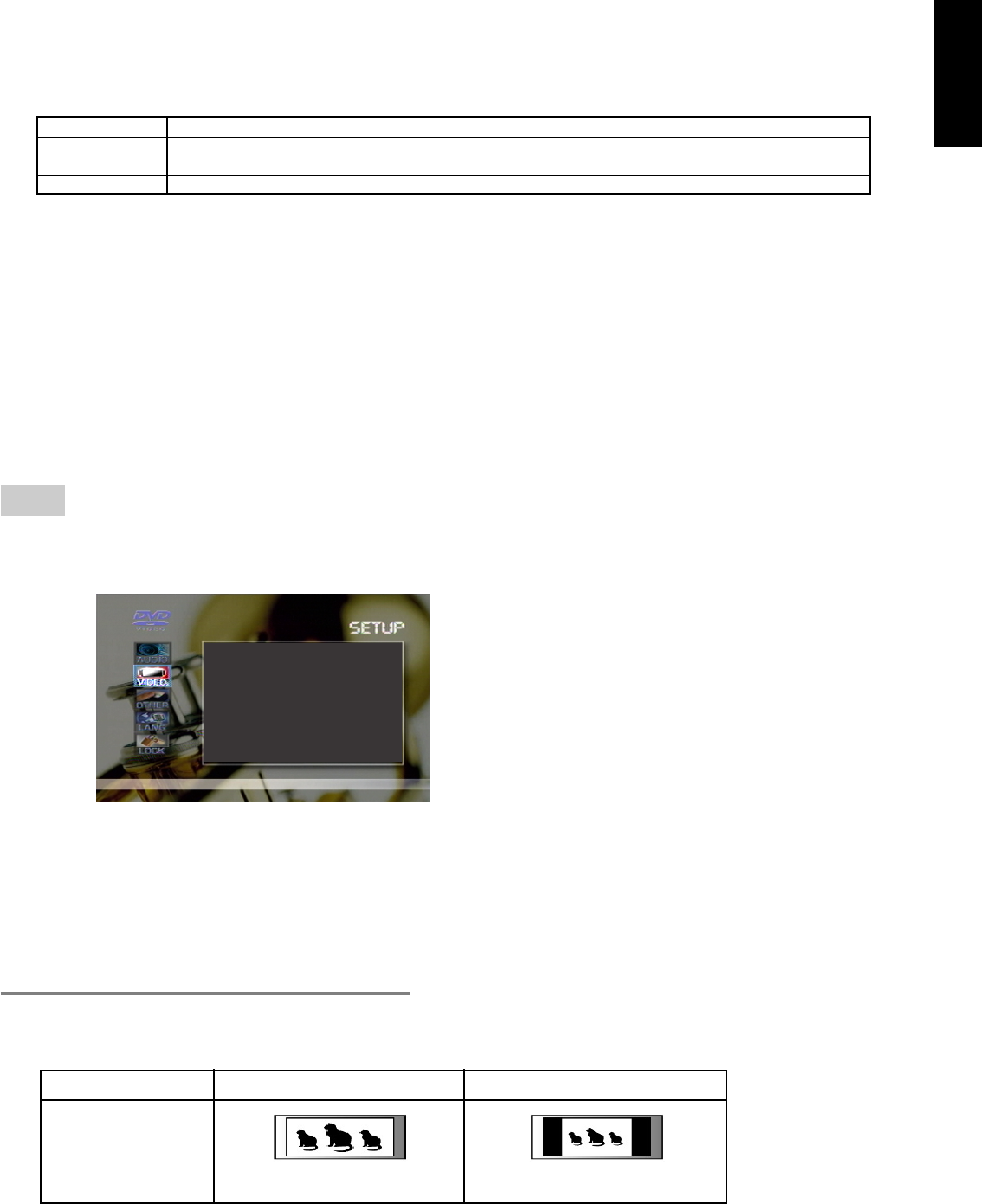
ENGLISH
33
4. DUAL MONO (Valid for Dolby Digital DVD disc)
DUAL MONO are two independent mono channels defined in Dolby Digital. DUAL MONO programs are mainly used for different
language versions in one program. This functions in a similar fashion to TV or VCR supporting secondary audio program. From
two MONO channels, STEREO, LEFT MONO, RIGHT MONO and MIXED MONO may be output in 4 different combinations.
OSD
T
V ASPECT
T
V TYPE
PROGRESSIVE
OUTPUT MODE
CAPTIONS
EXIT SETUP
ENGLISH
4:3 PS
NTSC
OFF
YCbCr
OFF
1. OSD LANG
This item is to select the language for On-Screen Display messages that will be displayed on the TV screen. When your desired
language is selected, all OSD messages are displayed in the selected language.
2. TV ASPECT
Set up TV aspect according to your TV set. If WIDE screen is supported on your TV, select 16:9 WIDE. If your TV supports only
4:3, you may select both 4:3 PS (Pan & Scan) and 4:3 LB (Letter Box).
When using a wide screen TV (16:9 aspect ratio)
Select 16:9 WIDE in the TV ASPECT value. Discs may be recorded in more than one screen format. Following the chart below,
make screen aspect adjustments in your wide screen TV according to the aspect ratio on the disc you are viewing.
Wide Screen Disc (16:9) Standard Screen Disc (4:3)
Screen
TV Setting Wide Standard
STEREO L channel on L speaker, R channel on R speaker
LEFT MONO L channel on L and R speaker
RIGHT MONO R channel on L and R speaker
MIXED MONO Mix two mono and output mixed mono on both (L, R) speaker
5. OPERATIONAL
To simplify the implementation of dialogue normalization, dynamic range control, and downmixing, Dolby Digital decoder
implementations offer standard operational modes called Line Mode and RF Mode. There are 2 values for OPERATIONAL. They
are Line Mode and RF Mode. Choose Line Mode when connecting to an amplifier, RF Mode for TV via ANTENNA.
6. DYNAMIC RNG (Valid for Dolby Digital DVD disc)
A consistent problem in the delivery of audio programming is that different members of the audience desire or even need different
amounts of dynamic range depending on the listening situation. Original high quality programs, such as feature films, are typically
mixed with a wide dynamic range. Using dialogue as a reference, loud sounds like explosions are often 20 dB louder, and faint
sounds like leaves rustling may be 50 dB quieter. In many listening situations, it is objectionable to allow the sound to become
very loud, and the loudest sounds must be compressed downwards in level. Likewise the very quiet sounds would be inaudible
and must be brought upwards in level to be heard. If you want to hear the original dynamic range recorded on disc set the
DYNAMIC RNG to 0. Otherwise set to 8 then the dynamic range is reduced by bringing down the level of the loud sounds and
bringing up the level of the quiet sounds.
Video
There are 6 submenus for VIDEO. They are OSD, TV ASPECT, TV TYPE, PROGRESSIVE, OUTPUT MODE, CAPTIONS. If you
select VIDEO, VIDEO sub items are displayed as shown in the figure.


















